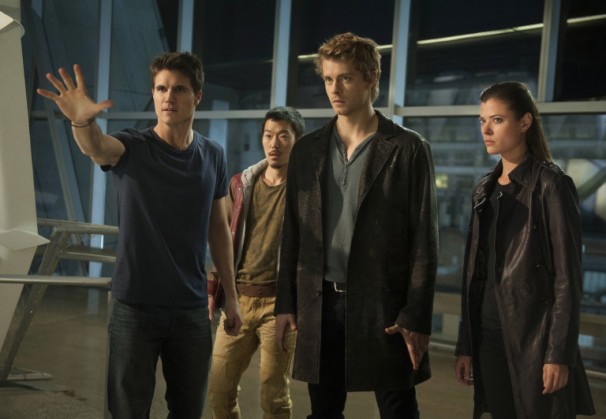
In recent years, stories about groups of young, attractive people suddenly acquiring supernatural powers have cropped up around the entertainment industry — the film “Chronicle” and the British teen series “Misfits,” to name two. The CW continues this trend with “The Tomorrow People,” executive produced in part by Julie Plec, whose past work includes shows such as “Kyle XY” and “The Vampire Diaries.”
Although “Tomorrow” originated as a British children’s television series in the 1970s, this 21st century adaptation stars Robbie Amell, who may seem familiar from his guest starring roles on “How I Met Your Mother” and “Revenge.” In “Tomorrow,” the 25-year-old actor does his best to mask his age behind exaggerated teenage emotions and clothes that would look appropriate on a middle schooler. Amell plays Stephen Jameson, a troubled New York high school student who has been hearing a voice in his head and is sleepwalking at night, and none of his psychiatrist visits or pills are helping.
Despite Stephen’s best efforts to function normally, the voice grows louder and more persistent, until one night he finally obeys it and boards a subway train. There, he is teleported by John Young (Luke Mitchell) to an abandoned subway station, which doubles as the headquarters of the Tomorrow People. Upon his arrival, he meets the source of the voice, Cara Coburn (Peyton List).
Stephen learns from Cara and John that they are all Tomorrow People, a group of advanced humans gifted with special powers. This revelation includes truly cringe-inducing dialogue. Cara tells Stephen “You think you’re a freak? You’re not. You’re on the brink of becoming someone truly extraordinary.” However, this portion of the pilot ratchets up the tension when it is revealed they are in danger from Ultra, the government agency set on hunting them down, removing their powers and even possibly killing them.
The first half of “Tomorrow’s” pilot is standard teen fare, with the writers layering on the teen angst, such as Stephen’s daddy issues. The writing, as evidenced by Cara’s dialogue, disappoints throughout the episode.
But once the pilot moves past the exposition and accepts the unusual rules of its universe, “Tomorrow” sets some unexpected plot points in motion. The show also, for the most part, downplays any unnecessary romantic angle, which is out of character for The CW. Still, in a brief scene toward the end of the episode, audiences discover Cara and John are in a relationship, implying a love triangle with the two and Stephen may inevitably arise. Regardless, the pilot demonstrates that Stephen’s journey and the plight of the Tomorrow People will take prevalence over any romantic indulgences.
While not revolutionary programming from The CW — especially considering the other sci-fi shows it will air this season — “The Tomorrow People” delivers a solid first outing. If the writers smooth over some issues, it could prove to be a campy cult favorite in the vein of predecessors that revolved around similar themes.
A version of this article appeared in the Wednesday, Oct. 9 print edition. Ife Olujobi is a staff writer. Email her at [email protected].




















































































































































